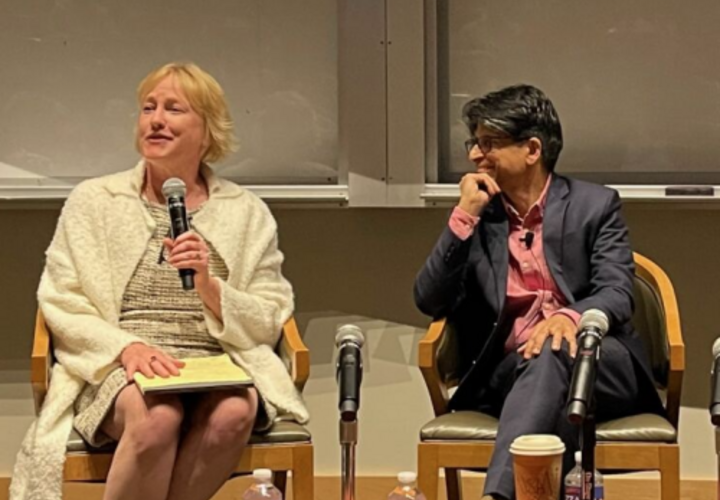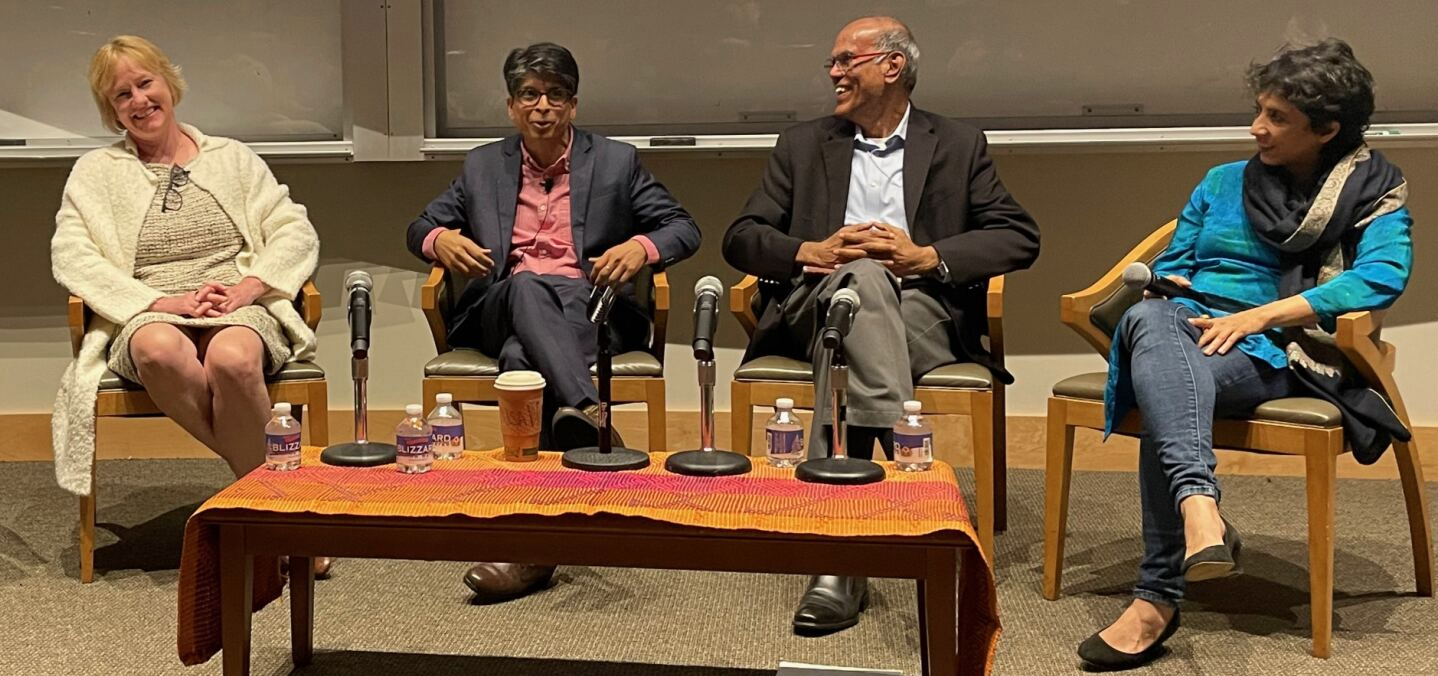Digital Inclusion & Economic Development: Conversations with Pramod Varma, Alix Zwane, and Rohini Pande
Voices in Development: A Podcast from Yale's Economic Growth Center explores issues related to sustainable development and economic justice in low- and middle-income countries. This episode features Pramod Varma, Chief Architect of Aadhaar, India's digital identification program, discussing the role of digital public infrastructure in economic development.

Voices in Development: Digital Inclusion & Economic Development • Transcript
Spotify | Apple Podcasts | Google Play | Amazon | Subscribe
Despite the widespread acknowledgment of the potential for digital technologies to accelerate inclusive economic growth, many lack access to mobile devices, internet connectivity, and affordable data. This digital divide, which includes gender-specific barriers, keeps billions of people from accessing the fundamental digital resources necessary for participation in the modern economy. Digital Public Infrastructure (DPI) enables countries to more effectively connect excluded people with markets, resources, and services through tools such as a digital ID – but the infrastructure alone does not guarantee equal access to those who could benefit.

Pramod Varma during his time at Yale for the Unlocking Digital Public Infrastructure for Global Growth and Inclusion Event.
In this episode of Voices in Development, Pramod Varma, the Chief Architect of Aadhaar, India's digital identification program, discusses the role of DPI in economic development, specifically in terms of increasing access to financial services. DPI is widely defined as the combination of networked open technology standards designed for the public good backed by a community of innovative and competitive market players working to drive innovation, especially across public programs. Varma argues that the most effective DPI is much like a highway network that is built by the government but traveled by vehicles designed and manufactured by the private sector. With the essential infrastructure in place, he suggests, the private sector, NGOs, and philanthropists can develop faster, cheaper, and more sustainable ways to reach marginalized communities.
We are building a sector of digital interventions that will allow faster, cheaper, affordable, accessible environments to happen, but we believe the government cannot solve any of this other than laying the highways, and the market players have to solve it.” – Pramod Varma
In 2009, when India began to build its DPI, only 17% of people in India had bank accounts, leaving the vast majority of the country without access to financial products, formal lending, and even the direct receipt of government funds, including pensions, scholarships, and farmer subsidies. At least half of the Indian government’s payments to citizens went to financial middlemen, Varma says. The DPI built since then, and particularly the creation of a widespread digital ID program that gave every citizen a unique identification number using biometrics, has enabled 85-90% of people in India to have bank accounts.
Varma also discusses some key issues faced by his team in creating digital IDs, especially those related to security. In the massive data collection process necessary to make a billion digital IDs in India, there was a temptation to solicit more information about individuals, even just for research purposes. But Varma’s team limited their data collection to four essential fields: name, date of birth, gender, and address. He argues that minimizing the amount of data collected made Aadhaar a more secure system.
Minimalism was an argument towards privacy, and we said if you don't capture data, you don't have to worry about security leaks. Because you don't have the data.” – Pramod Varma
This episode also featured Rohini Pande, Henry J. Heinz II Professor of Economics and Director of the Economic Growth Center, and Alix Peterson Zwane, Senior Fellow at the Yale Jackson School and CEO of Global Innovation Fund, who discussed the links between DPI and inclusion.
Pande believes that DPI dramatically increases the state's capacity to help the rural poor.
The hope of digital public infrastructure is that by relying on an individual's identity, which is not going to change over time, what you can do is you can set up a secure system and provide an individual who ideally has at least a mobile phone and a digital identity swift access to resources. And in a world where enough of the financial systems are in place, you don't perhaps even need to cash out the payment, you can not just receive money digitally, but also make payments digitally. So that's really the hope is that this is going to be a way to cut through the need for all the paperwork that you need to make a citizen be able to access resources that the state promises him or her, and to do that securely.” – Rohini Pande
But she notes that DPI’s reach can be reduced by limitations in digital access. In India, financial transactions commonly occur via smartphone, but women are far less likely than men to own or use one.
Zwane adds that DPI also increases the efficiency of aid delivery that many donors are looking for.
“This dovetails quite nicely with this emerging localization agenda, where donors are interested in making sure that increasing amounts of aid money actually does make it to recipient countries and to organizations headquartered in, based in those recipient countries.” – Alix Peterson Zwane

L-R: Alix Peterson Zwane, Pramod Varma, Duvvuri Subbarao (Senior Fellow at the Jackson School of Global Affairs and former Governor of the Reserve Bank of India), and Rohini Pande speaking at Unlocking Digital Public Infrastructure for Global Growth and Inclusion on October 12, 2023.
About the Guests
Dr. Pramod Varma is the Chief Architect of Aadhaar, India's digital identity program, which has successfully covered more than 1.3 billion people. He is also the chief architect for various India Stack layers such as eSign, Digital Locker, Unified Payment Interface (UPI), and Data Empowerment and Protection Architecture (DEPA) and played an integral role in designing India’s digital health infrastructure (ABDM), vaccination & immunization infrastructure (Co-WIN and DIVOC), and Unified Health Interface (UHI). Varma is currently the CTO of EkStep Foundation, a non-profit that supports digital learning for millions of children and teachers in India.
Rohini Pande is the Henry J. Heinz II Professor of Economics and Director of the Economic Growth Center, Yale University. She is a co-editor of American Economic Review: Insights. In 2018, Pande received the Carolyn Bell Shaw Award from the American Economic Association for promoting the success of women in the economics profession. She is the co-chair of the Political Economy and Government Group at the Abdul Latif Jameel Poverty Action Lab (J-PAL), a board member of Bureau of Research on Economic Development (BREAD) and a former co-editor of The Review of Economics and Statistics. Before coming to Yale, Pande was the Rafik Harriri Professor of International Political Economy at Harvard Kennedy School, where she co-founded Evidence for Policy Design. Pande received a PhD in economics from London School of Economics, a BA/MA in Philosophy, Politics and Economics from Oxford University and a BA in Economics from Delhi University.
Alix Peterson Zwane is a Senior Fellow at the Yale Jackson School and chief executive officer of the Global Innovation Fund. She has 20 years of experience advancing the agenda of evidence-based aid and international development. Alix was the first employee and executive director at Evidence Action, a non-profit that develops service delivery models to scale evidence-based programs. She also launched Evidence Action Beta, an incubator for innovations in development. She began her career in management consulting and was a member of the faculty of the Agricultural and Resource Economics Department at the University of California, Berkeley. She holds a Ph.D. in public policy from Harvard University and has published in Science, Proceedings of the National Academy of Sciences, the Quarterly Journal of Economics, and elsewhere.